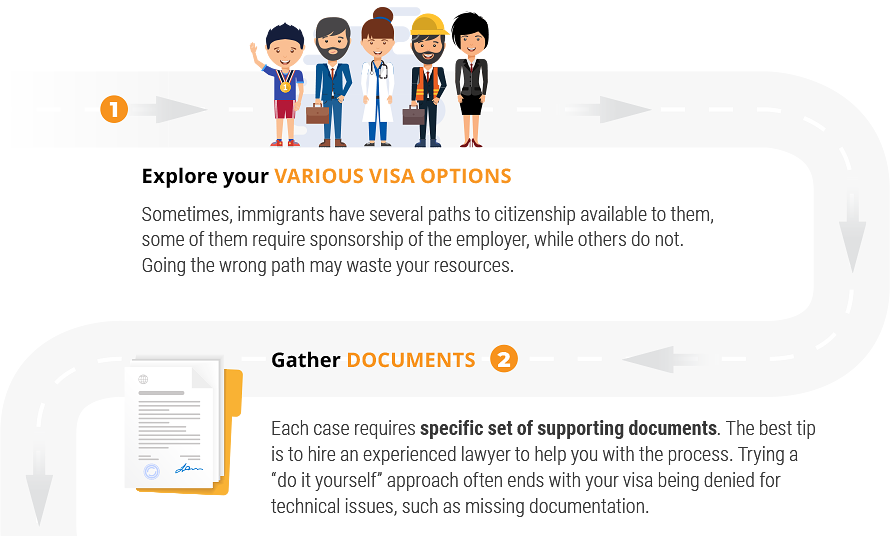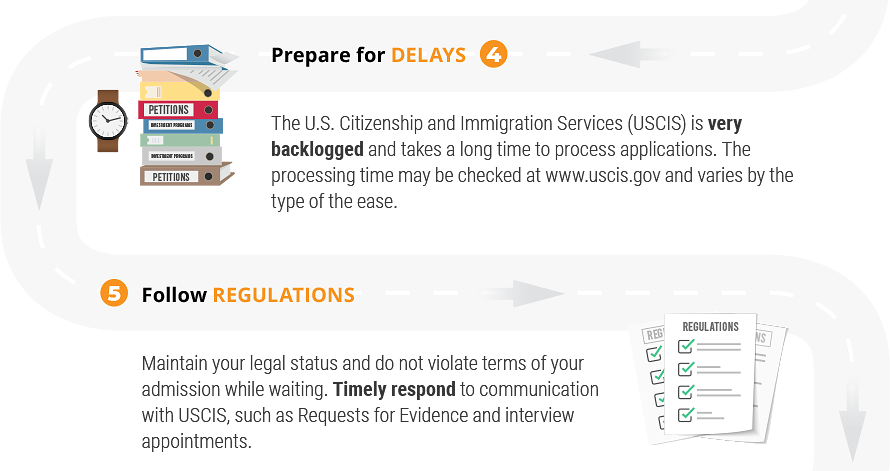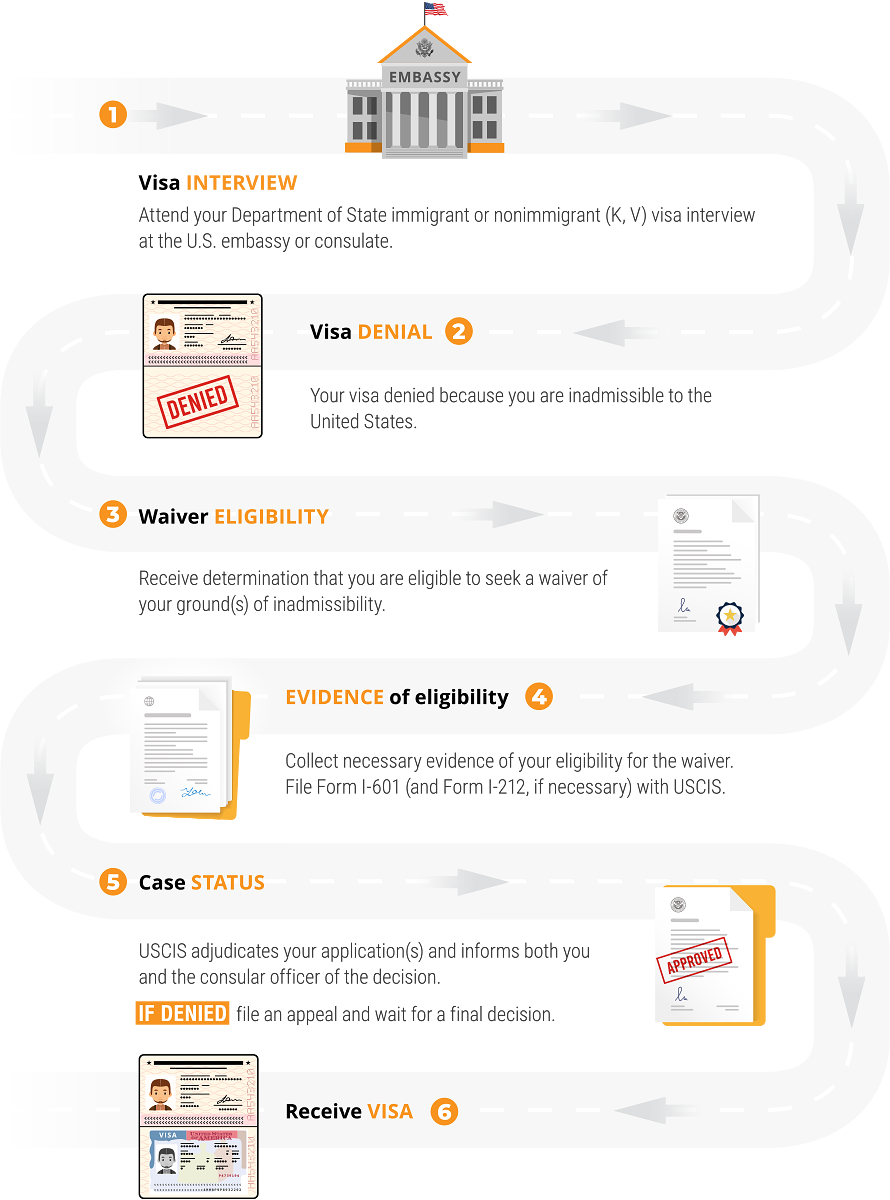Failure to prepare is preparing for failure
For any immigrant, the journey begins from creating a “road-map” to the goal. American immigration law is not created easy to navigate. Sometimes, getting the desired result (obtaining a visa or a permanent resident status) involves multiple Government agencies: Department of Homeland Security, Department of State, Department of Labor, Department of Justice, or others. It is important to understand early in the process what entities will be involved, what steps we will have to make, and how long each step should take.
Detailed analysis of your factual circumstances not only helps to develop the best immigration strategy available, but also assists in identifying possible impediments. Applicants with complex situations, such as prior history of immigration violations or criminal issues, source of investment funds that is lacking in documentation, sponsoring businesses with complicated structure or financial difficulties, should consult with the attorney as early in the process as possible to avoid costly delays and denials in future.
Whether you are relocating an employee or expanding your business into the American market, we are here to help you. We assist businesses and organizations of all sizes that come from various industries and fields.
We help entrepreneurs, scientists, medical professionals, students, entertainers, athletes, and other professionals with their immigration needs. Whether you are seeking to bring in a foreign employee or planning to make a business investment in the American economy, we will be happy to assist you throughout the process.
In most cases, immigrating to the U.S. involves two-step process: (establishing qualifications for the category sought and getting a visa or a permanent resident status (green card). Sometimes these two steps may be preceded by certain filings with Department of Labor.
During the first step, intending immigrant or a sponsoring party (employer or U.S. relative) submits petition with supporting documents to USCIS. Depending on complexity of the case and category, the adjudication may take from few weeks to several years.
If USCIS issues favorable decision, i.e. approves the petition, foreign national may apply for the visa at the consulate abroad or, if intending immigrant is already in the United States, he or she may seek change of status within the U.S. This second step may also be lengthy and depends on availability of visas subject to the annual quotas.
immigration process






If you are found "inadmissible"
U.S. Government may deny entry to the United States to any immigrant or visitor, if he or she is found “inadmissible”. There are several inadmissibility grounds that may relate to prior immigration history, criminal charges, health issues, or ability to support himself in the U.S.
If you are found inadmissible to the United States and are seeking an immigrant visa, adjustment of status, certain nonimmigrant statuses, or certain other immigration benefits, you must seek a waiver of inadmissibility. This usually means that you have to fully disclose circumstances that prevent you from entering the U.S. and ask authorities for “forgiveness.” Sometimes, several inadmissibility grounds require several independent applications.
Please remember that not all inadmissibility grounds may be “waived”. Certain crimes, such as drug-related offences, or multiple deportations may permanently bar an immigrant from entering the U.S. Before you make determination whether waiver is available in your case, you must have an extensive discussion of your circumstances with an attorney.
waivers of inadmissibility

IF YOUR VISA HAS BEEN DENIED because you have been convicted of certain crimes or violated immigration law, you must apply for a waiver.
Note: If you have been removed from the United States and need permission to reapply, in addition to a waiver of inadmissibility, you may be able to seek permission to reapply for entry into the United States at the same time you request a waiver of your ground(s) of inadmissibility.

While certain applicants may become residents of the U.S. through the process called “adjustment of status,” for many immigrants road to the green card goes through the consular processing. Consulates and embassies abroad are in charge of making a final determination on whether the immigrant is allowed to come to the United States permanently.
After immigrant petition has been approved, the file is forwarded to the National Visa Center (NVC). At that stage, immigrant needs to establish eligibility for the visa he will be applying for and will be asked to pay the visa fees. Because visa fees are not refundable, it is very important to make submission of all required documents in correct manner. The documents may include but not limited to affidavits of support, proof of qualifying relationship, affidavits of self-sufficiency, police records, military records, and various forms of biographic information.
What documents must be uploaded to the NVC portal prior to the interview at the consulate depends on the category of the case and individual circumstances of the applicant. Some visa categories require the applicant to designate an “agent” in the United States to receive correspondence regarding visa application and to upload the documents. Your attorney may serve as an “agent” for this purpose.
Consulate and embassies abroad are also in charge of issuing various categories of non-immigrant visas. Even though visa denials cannot be appealed, your attorney may request a supervisory review if you believe that your visa has been improperly denied.
Administrative background check
Sometimes, even applicants eligible for visas may become a subject to the background check. It means that the embassy will take extra time to verify information submitted at the visa application stage. If background check causes hardship to U.S. citizens or businesses because of the extensive delay, your attorney may file a request to expedite the procedure.
Request for additional information
Embassies and consulates may request an additional information and withhold issuance of the visa until information is submitted. It is extremely important to comply with the request in timely manner and provide the documents that are most responsive to the issue raised.
Visa denials
Even though there is no process to appeal decision of the consular officer, under certain circumstances applicants may request a supervisory review if they believe that the decision was a result of a legal error.
Usually, in case of the visa denial, it worth consulting with an attorney to identify deficiency in the previous application and to develop a strategy on correcting this deficiency with re-submission of the request for visa.
Let's talk about your case
For free assessment of your case send us an e-mail or use the contact form on this site. If your case requires in-detail discussion, we will be happy to schedule a consultation to talk about your options.